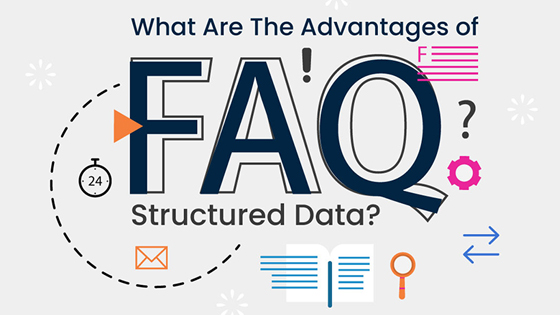Everyone has questions what are the advantages of faq structured data and Google does a fantastic job of providing answers. However, Google needs your help in providing the best answers to those who are conducting a keyword search. In May 2019, Google launched schema markups, which allowed on-page content
to be featured in SERPs as a rich snippet.
Stop me if I am getting too technical here, the tech jargon is not all that important so do not get hung up on it. What is important is the fact that Google now favors content that contains FAQs. Because of this, many webmasters and SEO agencies now use FAQ schema as a standard form of practice.
In this guide, we will discuss the importance of FAQ structured data and how it can help your site become more prominent in Google as a rich snippet.
What is FAQ structured data?
Frequently asked questions, also known as FAQ, will be listed out in a question format followed by answers. It is a valued section, as many readers will skip an entire article and look through the FAQs to find the answer to their question.
FAQ structured data is supported by Google, which means it needs to become a part of your content. Not only will it be a part of your website, but also become a part of SERP as a rich snippet and in Google Assistant when using your voice to search.
If you are wondering what a FAQ rich snippet looks like, here you go:
Benefits of FAQ Structured Data
These FAQ rich snippets will help increase the search visibility of your website. It provides an extra listing on SERPs (keep in mind that your competitor also has a chance to gain this spot). You may even notice that on mobile this section will take up the whole screen of the device. When you have an optimized FAQ structured data on your website it will help increase your presence in SERP, which will result in more page impressions for your targeted keywords and audience.
The FAQ schema will enhance SEO by categorizing content for specific FAQs. This will help differentiate it from other types of content in HTML code and make it much easier for bots to understand what your website is about.
Structured data helps crawlers to easily find questions and answers within the FAQ sections of your page. This increases your chances to gain the top position and/or be featured in the People Also Ask snippet.
What to do before Applying FAQ Structured Data
Let’s take a closer look at what you must do before applying FAQ structured data to your website.
Identify the appropriate pages
You are not limited to putting FAQs on one dedicated FAQ page. You can apply the FAQ structured data to any page that makes sense. A lot of people use their blogs as a way to sneak in an FAQ section that is highly optimized.
Conduct competitor research
Google will not display any more than 3 FAQ rich snippets on the 1st page of SERPs. They have set this limit so that FAQ schema does not dominate the search result. Therefore, you must conduct competitor research on target keywords in SERP. If that specific keyword already has 3 FAQ snippets shown or you are not ranking on the 1st page, then you will want to optimize your page to rank higher and include the FAQ structured data.
Determine the best question/answer sequence
Google will only display the first 3 questions, but there is a read more button that allows you to see a total of 10 FAQs. However, it is right to assume that the first three questions are the most important in drawing in the reader’s interest. It is that interest that will cause them to expand the answer box, click on the show more button, or visit the page.
Answer the questions accurately but be brief
Google has a variety of different featured snippets, which allows the searcher to find exactly what they want without having to click into a page. You do not want to overly answer a question because you may see a drop in traffic. Google wants answers that are precise but brief. Make sure you use relevant information that will encourage the reader to visit your page for more details.
Make good use of links
One of the best ways to encourage your reader to click into your page once they have read the FAQ is by including a link within the answer. This will act as a shortcut to help pull in organic traffic to a targeted landing page.
How to Apply FAQ Structured Data
Google provided guidelines to help website owners set up the FAQ structured data for their website. With any other structured data, you would check the attributes on schema.org, and FAQ structured data is the same.
There are some online FAQ schema markup generators that can help you with the coding. If you have a WordPress website then you can set up the FAQ schema markup. Plugins such as Yoast SEO can help you with the FAQ structured data automatically once the FAQ section is generated under their FAQ module.
What does FAQ schema code look like?
The JSON-LD code, which is Google’s preference, for FAQ markup looks like this:
<script type="application/ld+json">
{
"@context":"https://schema.org",
"@type":"FAQPage",
"mainEntity":[{
"@type":"Question",
"name":"QUESTION TEXT",
"acceptedAnswer":{
"@type":"Answer",
"text":"ANSWER TEXT"}
}]
}</script>
You can manually add this code to various pages that you want to display questions and answers, but this may be too technical if you are managing your website on your own and are not familiar with coding.
In this case, you can work with a digital marketing company that would take care of these types of needs, or you can choose to install a tool that will create FAQ markups for you automatically.
Once you have everything in place you will need to let Google know about the updates you have made on your website. Do this by requesting indexing in Google Search Console for the pages you have added FAQ structured data to. This will allow the FAQ rich snippet to be eligible for display in a more efficient matter.
Conclusion
The advantages of having FAQ schema on your website include improving organic traffic and gaining more real estate in SERPs. Plus, you are helping answer questions that your customers may have about your products and services. It is always a good idea to provide information
in a matter that is easy for your reader to obtain. FAQ structured data is just one more way you need to be optimizing your website to help push your business to the first page of Google.



